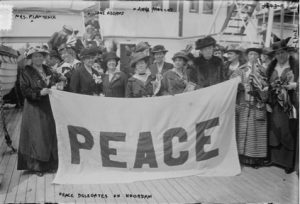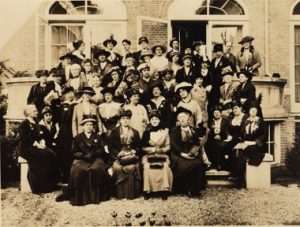Call to the Women of All Nations (1915)
“We feel strongly that at a time when there is so much hatred among nations, we women must show that we can retain our solidarity and that we are able to maintain a mutual friendship. Women are waiting to be called together. The world is looking to them for their contribution towards the solution of the great problems of to-day” – Aletta Jacobs
On April 28, 1915 more than 1,500 middle- and upper-class women from 13 nations, neutral and warring countries, participated in the International Congress of Women in The Hague, in the Netherlands to protest against the “Great War” that had started in August 1914. Aletta Jacobs, a Dutch feminist, suffragist and peace activist, took responsibility for organizing the event which was to take place in The Netherlands because of its neutral position during World War I. Invitations to participate in the Congress were sent to women’s organizations as well as individual women all over the world. To mobilize women Jacobs had drafted a “Call to the Women of All Nations,” which was published in the International Woman’s Suffrage Alliance newspaper, Jus’ Suffragii (The Right to Suffrage).
This Call is an important document of feminist’s struggle for peace during World War I. With the Call Jacobs appealed to the sense of sisterhood that transcended past borders and nationality. She believed that together women could find a solution that would bring peace to their lives in some manner. However, her suggestions were met with some resistance, as not all middle and upper-class women’s organizations supported international collaboration. As became evident in the month before the event. The German Union for Woman Suffrage had cancelled the planned international meeting and the Dutch Association for Woman’s Suffrage rejected any support for Jacob’s initiative.
Aletta Jacobs’ “Call to the Women of All Nations” is an important document of the history of the international women’s peace movement. It stated:
“From many countries appeals have come asking us to call together an International Women’s Congress to discuss what the women of the world can do and ought to do in the dreadful times in which we are now living.
We women of the Netherlands, living in a neutral country, accessible to the women of all other nations, therefore take upon ourselves the responsibility of calling together such an International Congress of Women. We feel strongly that at a time when there is so much hatred among nations, we women must show that we can retain our solidarity and that we are able to maintain a mutual friendship.
Women are waiting to be called together. The world is looking to them for their contribution towards the solution of the great problems of to-day.
Women, whatever your nationality, whatever your party, your presence will be of great importance.
The greater the number of those who take part in the Congress, the stronger will be the impression its proceedings will make.
Your presence will testify that you, too, wish to record your protest against this horrible war, and that you desire to assist in preventing a recurrence of it in the future.
Let our call to you not be in vain!”
More than 1,500 women made it to The Hague, many more intended to come but were unable to because they were prevented from leaving their country by their own national governments or they were denied passports and some could simply not make the journey to The Hague because national borders were closed due to World War I. The North Sea was closed off as well, because of the economic blockade of Germany by Britain, which prevented the women’s delegation from Great-Britain to cross over. Fortunately, three British ladies did manage to attend the Congress. The women who made it to the Congress came from: Norway, Germany, Hungary, Italy, Belgium, Austria, Canada, the United States of America, Denmark, Great Britain and the Netherlands. The congress discussed what women could do to bring peace to their countries.
Aletta Jacobs addressed the delegates during the opening session and spoke of the aim of the Congress. She stated: “Those of us who have convened this Congress of Women assembled to protest against war and to suggest steps which may lead to warfare becoming an impossibility”. During the four-day conference, a series of evening meetings were held. At the end of the Congress, a set of resolutions were adopted at the business sessions with regards to seven different subjects. These were: women and war, actions towards peace, principles of a permanent peace, international cooperation, the education of children, women and the peace settlement conference and lastly a resolution stating the actions to be taken after the congress, the so-called “Twelve-Point Resolution,” which influenced the United States’ President Woodrow Wilson’s “Fourteen Points which determined how the United States and other Allied Powers reconstructed the post-World War I order. The women’s peace organization they created, the Women’s International League for Peace and Freedom (WILPF), still operates to this day. The American suffragist Jane Addams served as its first president. Without Aletta Jacobs’ call and her effort to organize the women together, none of this could have possible.
Rosie Tran, Political Science ad Women’s and Gender Studies, Class of 2020
Sources
Literature and Websites
- Jacobs, Aletta. “Call to the Women of All Nations,” in Lives and Voices: Sources in European Women’s History, ed Lisa DiCaprio and Merry E. Wiesner, 413-415. Boston: Houghton Mifflin Company, 2001.
- “Aletta Jacobs.” Wikipedia, at: https://en.wikipedia.org/wiki/Aletta_Jacobs (Accessed 22 April 2018).
Images




